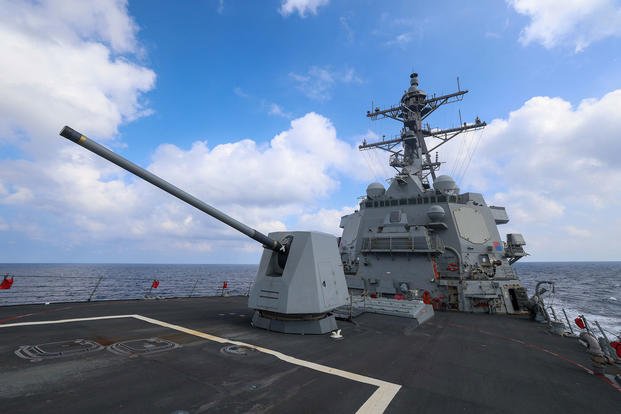TAIPEI, Taiwan — Warships from the United States, Australia and Japan have held joint drills in the South China Sea in defiance of Beijing, which claims sovereignty over virtually the entire strategic waterway.
The U.S. 7th Fleet that oversees most U.S. Navy operations in the region said the guided-missile destroyer USS John Finn and combat ship USS Gabrielle Giffords carried out operations with navy ships from Japan and Australia on Wednesday and Thursday.
There was no word on whether the exercises were conducted close to islands and shoals claimed by Beijing, which has built military bases on at least seven islands by piling concrete and sand on top of coral atolls. Beijing objects strongly to foreign naval operations in the area, saying historical records prove it belongs to China.
Each year, an estimated $5 trillion in international commerce passes through the South China Sea, which also holds vital fish stocks and underwater mineral resources.
The U.S. takes no formal stand on sovereignty in the area but rejects China's claims, partly based on a 2016 ruling by a United Nations-backed court in The Hague. There was no immediate reaction to the exercises from China's Defense Ministry.
“This multinational sail fortifies our relationship between the U.S., Japan and Australian allies,” Cmdr. Earvin Taylor, John Finn's commanding officer, said in a statement from the 7th Fleet. “We promote transparency, rule of law, freedom of navigation and all principles that underscore security and prosperity in the Indo-Pacific.”
Australian Commodore Jonathan Ley said in the statement that such deployments are "crucial for enhancing mutual understanding and our ability to operate together.”
The U.S., Australia and Japan also operate together in a strategic alliance known as the Quad that also includes India, a Chinese rival in Asia.
The Quad has frequently accused China of flexing its military muscles in the South China Sea and aggressively pushing its maritime territorial claims.
Beijing maintains that its military is purely defensive and protects its sovereign rights, and calls the Quad an attempt to contain its economic growth and influence.
The navies of the four countries regularly hold drills seen as part of an initiative to counter China’s growing assertiveness in the Pacific and Indian oceans and waters surrounding Taiwan. China and Japan also claim exclusive ownership over an uninhabited island group in the East China Sea controlled by Tokyo, with China routinely dispatching ships and planes to the area.
China applies similar tactics with Taiwan, a self-governing island republic of 23 million that it claims as its own territory, to be conquered by force if necessary. Taiwan's Defense Ministry said Thursday it had detected four Chinese ships operating in the area and that it had, as usual, upgraded security ahead of the Lunar New Year holiday starting at the end of the week.











